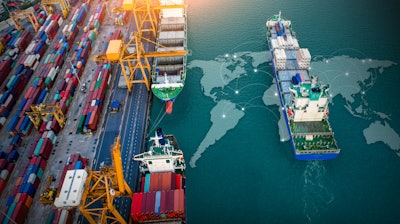
People around the globe are more connected to each other than ever before. Information and money flow more quickly than ever. Goods and services produced in one part of the world are increasingly available in all parts of the world.
International travel is more frequent and international communication is commonplace. Globalization is an economic tidal wave that is sweeping over the world. It can’t be stopped, and there will be winners and losers. But before drawing any conclusions on how it affects the U.S. economy, consider some of the general cons and pros of globalization.
Read: Globalization Is Weakening
The Disadvantages of Globalization
- Multinational corporations are accused of social injustice, unfair working conditions (including slave labor wages and poor living and working conditions), as well as a lack of concern for the environment, mismanagement of natural resources and ecological damage.
- Multinational corporations, which were previously restricted to commercial activities, are increasingly influencing political decisions. Many think there is a threat of corporations ruling the world, because they are gaining power due to globalization.
- Opponents say globalization makes it easier for rich companies to act with less accountability. They also claim that countries’ individual cultures are becoming overpowered by Americanization.
- Anti-globalists also claim that globalization is not working for the majority of the world. During the most recent period of rapid growth in global trade and investment, 1960 to 1998, inequality worsened both internationally and within countries. The UN Development Program reports that the richest 20 percent of the world's population consume 86 percent of the world's resources, while the poorest 80 percent consume just 14 percent.
- Some experts think that globalization is also leading to the incursion of communicable diseases. Deadly diseases like HIV/AIDS are being spread by travelers to the remotest corners of the globe.
- Globalization has led to the exploitation of labor. Prisoners and child workers are used to work in inhumane conditions. Safety standards are ignored to produce cheap goods. There is also an increase in human trafficking.
- Social welfare schemes or “safety nets” are under great pressure in developed countries because of deficits and other economic ramifications of globalization.
The Positive Side of Globalization
Globalization has a positive side as well. Supporters of globalization argue that it has the potential to make this world a better place to live and will solve some deep-seated problems like unemployment and poverty. The marginal are getting a chance to exhibit in the world market.
Here are some other arguments for globalization:
- The proponents of global free trade say that it promotes global economic growth, creates jobs, makes companies more competitive, and lowers prices for consumers. It also provides poor countries, through infusions of foreign capital and technology, with the chance to develop economically by spreading prosperity creates the conditions in which democracy and respect for human rights may flourish.
- According to libertarians, globalization will help us to raise the global economy only when the involved power blocks have mutual trust and respect for each other’s opinion. Globalization and democracy should go hand-in-hand. It should be pure business with no colonialist designs.
- Now there is a worldwide market for companies and consumers to access products from different countries.
- There is a world power that is being created gradually, instead of compartmentalized power sectors. Politics are merging and decisions that are being made are actually beneficial for people all over the world.
- There is more influx of information between two countries.
- There is cultural intermingling. Each country is learning more about other cultures.
- Since we share financial interests, corporations and governments are trying to sort out ecological problems for each other.
- Socially we have become more open and tolerant toward each other, and people who live in the other part of the world are not considered aliens.
- Most people see speedy travel, mass communications and quick dissemination of information through the Internet as benefits of globalization.
But what about the American economy?
What is good for third world countries like Kenya or countries with tremendous growth like China may not be good for America. America has been outsourcing both manufacturing and white-collar jobs. Since 1980, American manufacturing has lost some 6 million jobs and has shrunk from a high of 29 percent of the GDP in 1950 to 11 percent of the GDP today. This has happened, because manufacturing work is outsourced to developing nations like China where wages and the cost of manufacturing goods are lower.
In the service industries high paying jobs like programmers, editors, scientists, accountants and medical technicians have lost their jobs due to outsourcing to cheaper locations like India. This also includes customer support, marketing, insurance and just about any job that can be done over the Internet. If you lose a manufacturing or a professional service job, the alternative is to take a lower paying service job.
Outsourcing has created a culture of job insecurity. Prior to globalization, people had stable, permanent jobs. Now people live in constant dread of losing their jobs to foreign competition and outsourcing. This increased job competition has led to a reduction in wages and consequently lower standards of living.
Economists say that American consumers gain from a wider choice of products and lower prices associated with open trade. This benefit, when combined with gains to workers employed in export-generating sectors, is supposed to more than offset losses to workers employed in import-competing sectors. But the trade deficit keeps getting bigger with twice as many imports as exports, and median wages have not been growing. In addition, the trade deficit is being kept artificially high by Asian countries manipulating their currencies by 20 to 40 percent and the dollar value continues to fall. In the long run, the low-priced imported goods will not offset the loss of many family wage jobs.
Proponents also see U.S. corporations building factories in other countries equally well-equipped as plants in their own country as a good thing. However, this also means transferring our technologies and much of the R&D along with the products. I would argue that giving our foreign competitors access to our technologies and research and development will cripple our manufacturing sector permanently. We are playing right into the hands of our biggest competitor (China), when we really should be doing everything in our power to not give them any advantage over us.
By outsourcing our plants and technologies we will lose the very factor that has made America great — innovation. In his report ‘Securing America’s Manufacturing Base,’ Joel Popkin says, “Manufacturing’s innovation process is the key to past, present, and future prosperity and higher living standards. The intricate process starts with an idea for a new product or process, prompting investments in research and development. R & D successes lead to investments in capital equipment and workers, and to ‘spillovers’ that benefit manufacturing and other sectors. This process not only generates new products and processes, but also leads to well-paying jobs, increased productivity, and competitive pricing. Yet while this process produces wealth and higher living standards, most of it is hidden from view and poorly understood.”
As manufacturing continues to decline, so does our ability to innovate. In the long term, this means fewer well-paid jobs, lower productivity, declining wages, declining living standards and low economic growth. Globalization is a big part of this decline and will affect all jobs and all sectors of the economy. From the point of view of multinational corporations and Wall Street investors, globalization is probably viewed as a wonderful phenomenon with many opportunities. But from the point of view of American manufacturers, manufacturing workers, the middle class, professional service workers and overall economic growth, I think the disadvantages far out weigh the advantages.
We can’t do much to stop the tidal wave of globalization but we can enforce the trade laws, force the competition to play by the same rules and stop giving our competitors the tools to ultimately win the global war.















